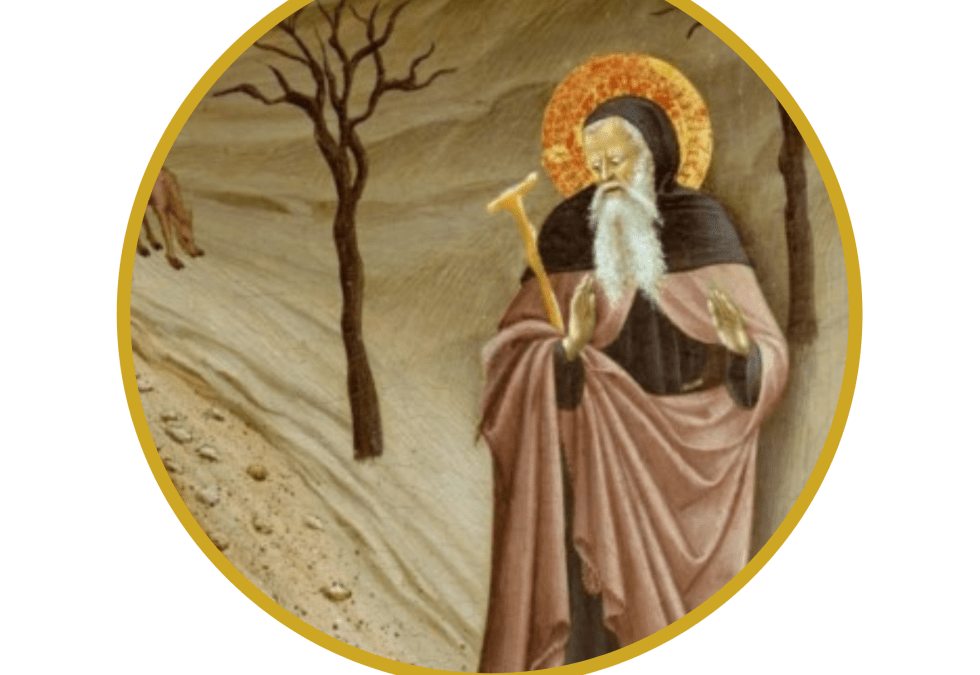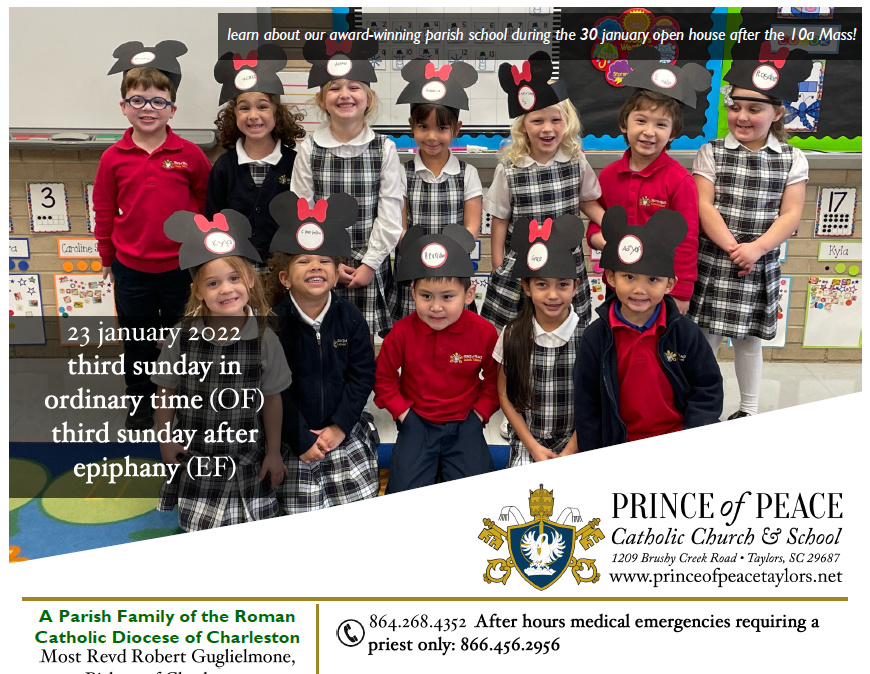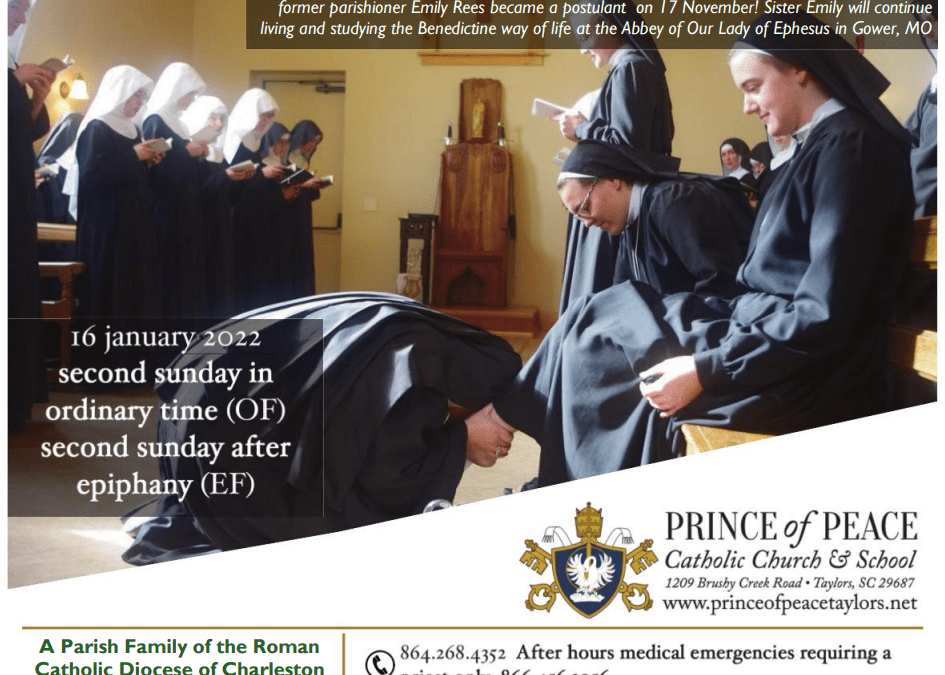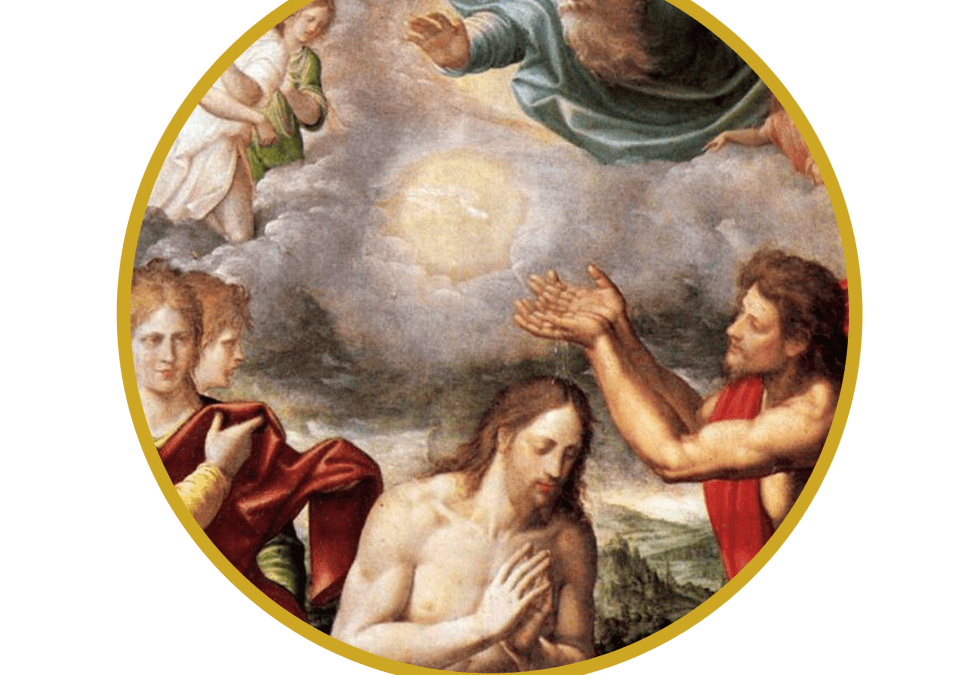
by popadmin | Jan 17, 2022 | CIC Saint Writeups
17 January: Feast of Saint Anthony. Known as Saint Anthony “the Great” and the “Father of Monks”, he was born in Egypt around the year 250 to distinguished parents. After their untimely deaths, he dedicated himself wholly to acts of mortification. One day in church (around age 18) he heard the words of the Gospel: “If you wish to be perfect, go, sell what you have, and give it to the poor” (Matt. 19:21). Anthony felt as if Christ had spoken to him personally, giving a command he must obey. Without delay he sold his property, gave the proceeds to the poor, and went into the desert. He chose an inaccessible place in the wilderness where he dedicated his life to God in manual work and continual prayer. He lived in solitude for over 20 years. His bed was the hard ground. He fasted rigorously, ate only bread and salt, and drank only water. He would not take food before sundown; at times he passed two days without any nourishment. He often spent whole nights in prayer. In his older age, he imparted wisdom to a group of disciples and encouraged them to lead a monastic life. Because he was the first Christian to retire to a monastic life, he is considered to be the first monk and also the father of all monks. Anthony suffered repeatedly from diabolical attacks, but these merely made him more steadfast in virtue. He would encourage his disciples in their struggle with the devil with such words: “Believe me; the devil fears the vigils of pious souls, and their fastings, their voluntary poverty, their loving compassion, their humility, but most of all their ardent love of Christ our Lord. As soon as he sees the sign of the Cross, he flees in terror.” He died in 356 on Mount Kolzin by the Red Sea, at the age of 105. A year later his friend, the fearless bishop and confessor St. Athanasius, wrote his biography, which for centuries became the classic handbook of ascetics. He describes how St. Anthony saw the purpose of asceticism as not to destroy the body but to bring it into subjection, re-establishing man’s original harmonious integrity, his true God-given nature: “His was a perfectly purified soul: no pain could annoy him, no pleasure bind him. In him was neither laughter nor sadness. The sight of the crowd did not trouble him, and the warm greetings of so many men did not move him. In a word, he was thoroughly immune to the vanities of the world, like a man unswervingly governed by reason, established in inner peace and harmony.”
Saint Anthony famously taught his monks: “Let it be your supreme and common purpose not to grow weary in the work you have begun, and in time of trial and affliction not to lose courage and say: Oh, how long already have we been mortifying ourselves! Rather, we should daily begin anew and constantly increase our fervor… And that we may not become weary and disheartened, it is good to meditate on the words of the apostle: ‘I die daily.’ If we live with the picture of death always before our eyes, we will not sin… For our life is by nature uncertain and is daily meted out to us by Providence. If we are convinced of this and live each day as the apostle suggests, then we will not fall into sin; no desire will enslave us, no anger move us, no treasure bind us to earth; we will await death with unfettered hearts.”
Ideas for celebrating this feast at home:
- For dinner, make “St. Anthony of the Desert Soup” – recipe at this link.
- Read Athanasius’ accountof St. Anthony.
- Learn more about Western Monasticism.
- Pray for those in monastic life and pray for a resurgence of vocations to this life.
- As a family, pray to St. Anthony for vigilance in the fight against temptations and sin.
- Make a sacrifice or mortification on behalf of someone in need of Christ’s mercy or healing.
(Sources: exerpts from The Church’s Year of Grace by Pius Parsch; catholicculture.org)

by popadmin | Jan 17, 2022 | Bulletin
Click to read this week’s bulletin: 23 January 2022. Changes to the schedule are noted here.

by popadmin | Jan 13, 2022 | Bulletin
Click to read this week’s bulletin: 16 January 2022. Check our page for schedule changes to see the latest news.
by popadmin | Jan 9, 2022 | Parish Life
Saturday Afternoon, 15 January
- No confessions at 3.30p
- 4p Anticipated Latin EF Mass
- 5p Anticipated English Sung Mass (livestreaming Masked Mass in Croghan Hall with Communion)
- Blessing of the Great Nativity with Prosecco Toast for Donors will be rescheduled at a later date
- 6p Adoration Chapel Closes
Sunday, 16 January
- No Mass, RE, Vespers, ministry or other events (CYO, basketball, etc)
Monday, 17 January
- No Mass, school (scheduled holiday), ministry or other events (basketball, etc)
Tuesday Afternoon, 18 January
- 12N Church, Office and Adoration Chapel Open with Latin EF Mass
- 6.30p Epiphany Blessing and Mass is cancelled
Please remember that we close the church due to expected inclement weather for a number of safety related reasons: the Fathers do not live on campus, but on the top of a hill where the road is usually not snowplowed or cleared of ice; ice storms north of I-85 and 385 often cause power outages which mean no electricity or water, downed trees and power lines on and near campus; etc. Thank you in advance for your understanding.

by popadmin | Jan 9, 2022 | CIC Saint Writeups
8 January: Feast of the Baptism of the Lord. Today, we celebrate the baptism of Christ in the Jordan by John the Baptist: a milestone event in the life of Jesus and in Christianity. This feast day is usually celebrated on the Sunday after the Feast of the Epiphany. It brings to an end the liturgical season of Christmas. {Christmas is the feast of God’s self-revelation to the Jews, and Epiphany celebrates God’s self-revelation to the Gentiles.} At his Baptism, Christ reveals himself again, this time to repentant sinners. The Baptism of Jesus also marks the first public revelation of all Three Persons in the Holy Trinity, and the official revelation of Jesus as the Son of God to the world by God the Father. Jesus’s baptism is described in all four Gospels and it marks the beginning of his public ministry. “After Jesus was baptized, he came from the water and behold, the heavens were opened [for him], and he saw the Spirit of God descending like a dove [and] coming upon him. And a voice came from the heavens, saying, ‘This is my beloved son, with whom I am well pleased’ ” (Mt 3:16-17). We know that Jesus, holy and sinless, did not need to be baptized. Yet he humbled himself and submitted to his Father’s will. Jesus’s baptism sanctified the waters and instituted the Sacrament of Baptism. The Catechism of the Catholic Church states: Our Lord voluntarily submitted himself to the baptism of St. John, intended for sinners, in order to “fulfill all righteousness.” Jesus’ gesture is a manifestation of his self-emptying. The Spirit who had hovered over the waters of the first creation descended then on the Christ as a prelude of the new creation, and the Father revealed Jesus as his “beloved Son.” (CCC 1224) Fr. Antony Kadavil explains this further: “Neither John nor Jesus invented baptism. It had been practiced for centuries among the Jews as a ritual equivalent to our Confession. Until the fall of the Temple in 70 A.D., it was common for Jewish people to use a special pool called a Mikveh – literally a “collection of water” – as a means of spiritual cleansing. Men took this bath weekly on the eve of the Sabbath; women, monthly. Converts were also expected to take this bath before entering Judaism. The Orthodox Jews still retain the rite. John preached that such a bath was a necessary preparation for the cataclysm that would be wrought by the coming Messiah. Jesus transformed this continuing ritual into the one single, definitive act by which we begin our life of Faith. In effect, He fused His Divine Essence with the water and the ceremony. In this humble submission, we see a foreshadowing of the “baptism” of his bloody death upon the cross. Jesus’ baptism by John was the acceptance and the beginning of his mission as God’s suffering Servant. He allowed himself to be numbered among sinners. Jesus submitted himself entirely to his Father’s will. Out of love, He consented to His baptism of death for the remission of our sins.” On this glorious feast day, we also celebrate our own baptisms, which freed us from sin and made us sons and daughters of God. Through baptism, God has opened the doors to Heaven. Deo gratias!
Ideas for celebrating in your home:
- The Christian symbol for Baptism is the shell, which you can easily turn into a dinner theme. Make pasta shells, Nacho Stuffed Shells, or Italian stuffed shells. Decorate the table with sea shells (children can color or craft some if you don’t have any real ones).
- Pull out your family’s Baptismal candles and light them at dinner. Tell children about the Baptism of Our Lord and their own special Baptismal days! (Share stories from family baptisms around the dinner table: Talk about who was there, how godparents were chosen, celebration afterwards, etc.)
- This is a wonderful day to renew our baptismal vows: click here for instructions.
- Start a family tradition of celebrating baptism anniversaries: Here are ideas!
- Finally, if you have access to a pool, pond, river or stream: we dare you to take a winter plunge in celebration of Jesus’s baptism in the Jordan!




Recent Comments